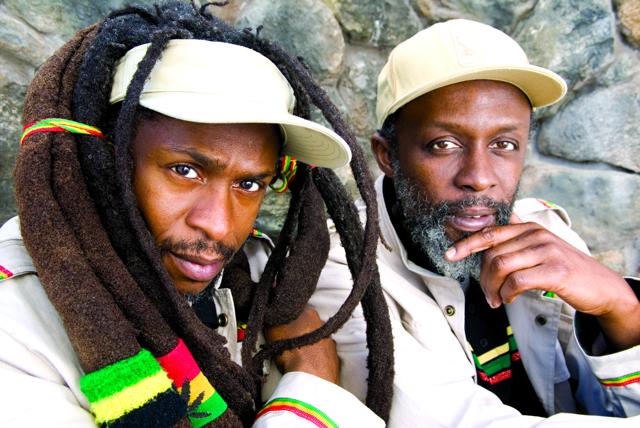Ask David “Dread” Hinds where his band — the legendary British reggae stalwarts Steel Pulse — rates in the pantheon of rasta and “riddim” rockers both past and present, and he hesitates for a second. But only for a second.
“Where would we set ourselves … do you really want to know? I'd set ourselves right behind Bob Marley, or right beside him,” says Hinds. He’s fresh off the tour bus and speaking to Xpress from a Sheraton West hotel somewhere in SoCal, just hours before the band's gig at the Hollywood Park Race Track in Inglewood, Calif.
“Because when it comes to any band — and no disrespect to any other band — I think we can afford to say we have fulfilled his experience, and I think we have gone in a direction he would want us to go in, that he would go in, as far as what we are doing … That's what I think,” says Hinds, who, since Steel Pulse's inception in Birmingham, England in 1975, has been the band's leader, vocalist, rhythm guitarist and chief songwriter.
“When I see … people that knew Bob Marley, and worked with him, they tell us time and time again we remind them of him and what he was about and what he wanted to do,” he says. “I even used to hear that from Rita [the late Marley's wife, backup singer and family matriarch] years ago when we used to go to Jamaica on a frequent basis. When we get Rita's sign of approval, hey, that's good enough for me.”
The comparison is not so much braggadocio; it’s more of a similar modus operandi to that of the late reggae superstar, who took his roots-y, rock-inflected West Indies riddims — flavored with Third-World politics and uncanny Western pop sensibility — and turned it into an enduring global musical and cultural phenomenon.
“We have our own fishes to fry, we have our own experiences from a British standpoint,” says Hinds, an Englishman born of Jamaican parents. “But as far as we try to get inside the music and crossover to the people, Marley was all about reaching the people. … Hey, we're still talking about him 30 years later, right? And we're all about that.”
Now in its 36th year, Steel Pulse (named after a racehorse), has 20 studio, live and anthology albums under its belt (including Handsworth Revolution, considered by many critics as a landmark reggae album); has played at President Bill Clinton's 1993 inauguration (the first and only reggae band to do so); and has been nominated for several Grammys. The band is recording a new album to follow up 2004's African Holocaust, says Hinds, (though the title and release date are still undetermined). The band has undergone numerous lineup changes, with Hinds and keyboardist/vocalist Selwyn “Bumbo” Brown the only remaining original members.
And while the band has recorded pop-oriented and synth-heavy albums, with dalliances in hip-hop and dancehall along the way, the band's oeuvre still remains firmly rooted in politics and socially conscious songs.
In fact, the band first found it hard to bring its Afrocentric message to the masses. The nascent punk rock and new-wave scene of the ‘70s and early ‘80s enabled Steel Pulse to make a name for itself by scoring coveted opening slots with such bands as The Clash, The Stranglers, Generation X, The Police, XTC and Bob Dylan, among others.
Despite the band's infectious grooves and dance-worthy rhythms — and overall positive vibrations — its political and social consciousness should be on full display when Steel Pulse brings its show to Pisgah Brewing Company’s outdoor stage, says Hinds.
Expect several songs off the group's socially conscious True Democracy and Earth Crisis albums of the early ‘80s, Hinds says. “But [you're] also going to hear a good crosssection of the tracks the band's done over the years,” he says, as well as new songs, part of a movie score the band composed last year and, especially, a song that highlights the current plight of earthquake-ravaged Haitians. Haiti, Hinds says, is at the forefront of his and his bandmates' minds these days.
“We're still out there trying to support the Haitian cause right now,” Hinds says. “The rest of the world might have forgotten them, but we haven't. [Haiti] is still a major part of what we are about as a band. Haiti is a country that means a lot to us. We recognize them as the first [black] country that was independent of colonial rule. And that stands for a lot for us right now. … We have a lot of admiration for that country.”
And, since the band will be playing in Black Mountain, whose history is more than a little tainted by racism, Hinds says the band will play one of its earliest and most recognizable hits, too, “Ku Klux Klan.”
“Of course,” he says, “that's going to be done.”
— Freelance writer and former Mountain Xpress reporter Hal Millard can be reached at hlmillard@gmail.com.
who: Steel Pulse
where: Pisgah Brewing Company, 150 Eastside Drive
when: Wednesday, June 1 (8 p.m. $20. pisgahbrewing.com)




Before you comment
The comments section is here to provide a platform for civil dialogue on the issues we face together as a local community. Xpress is committed to offering this platform for all voices, but when the tone of the discussion gets nasty or strays off topic, we believe many people choose not to participate. Xpress editors are determined to moderate comments to ensure a constructive interchange is maintained. All comments judged not to be in keeping with the spirit of civil discourse will be removed and repeat violators will be banned. See here for our terms of service. Thank you for being part of this effort to promote respectful discussion.